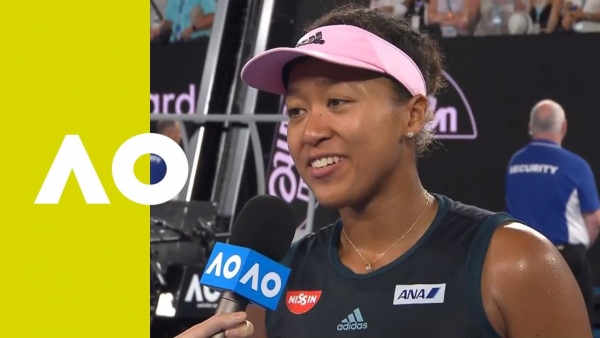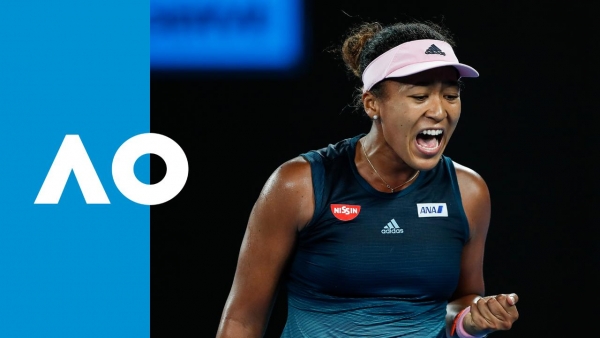Backing up first-time success on the major stage has not been the easiest task on the women’s tour over the past decade.
When Li Na made history and won Roland Garros in 2011, she lost in the Wimbledon second round a few weeks later. Petra Kvitova claimed her maiden Grand Slam title at Wimbledon in 2011, then lost in the US Open first round straight after. Sam Stosur suffered a similar fate at the Australian Open in 2012, a few months after lifting the US Open trophy.
More recently, Angelique Kerber crashed out of her round one at Roland Garros in 2016, after she had claimed a tremendous victory at the Australian Open over Serena Williams in the final. Even last year’s champion in Melbourne, Caroline Wozniacki, hasn’t made it past the fourth round at a Slam since.
But then came Naomi Osaka – a soft-spoken, pensive, Japanese youngster with a fierce game that helped her etch her name in the history books as her country’s first-ever major singles champion when she won the US Open last September.
MORE: Preview – High stakes for final duo
Back in a Grand Slam for the first time since, Osaka finds herself in the final of the Australian Open, carrying a 13-match winning streak at the majors into her championship match against Petra Kvitova on Saturday.
The 21-year-old Osaka is the first woman since Jennifer Capriati in 2001 to win a maiden Grand Slam, then immediately back it up by reaching the final of her next one.
“It's a little bit unreal. At the same time, I realise the work that I put in during the off-season. Every match that I played, I tried my best. It just felt like it was a continuous effort,” explained Osaka following her semifinal success over Karolina Pliskova on Thursday.
“I can't believe it, but at the same time it's sort of the reality I am in right now, so I can only keep going forward from here.”
Digging a bit deeper into the Osaka psyche, it’s not so hard to understand how she is pulling this off.
Speaking to her in Beijing last October, less than a month after her US Open breakthrough, Osaka sounded far from content by that one Grand Slam title.
MORE: Osaka has eyes on final step
“I think life is more than one tournament,” she said in the Chinese capital.
“It’s not like I’m done playing tennis. I don’t expect myself to just win one Grand Slam. Not to be cocky or anything, but I feel like the more confidence I put in myself, the better I play. So I try to tell myself that if I believe in myself, then there’s a lot of good things that will happen.”
During the off-season, Osaka certainly put in the work, with her coach Sascha Bajin (former hitting partner of Serena Williams, who also worked with Sloane Stephens, Wozniacki, and Victoria Azarenka) and her fitness trainer Abdul Sillah, who worked with Williams for more than a decade, and also was on Stephens’ team when she won the 2017 US Open.
This fortnight in Melbourne, Osaka has looked fitter than she’s ever been, and has been running down balls like it was nothing while still relying on her signature power game. She leads the tournament with 50 aces – out-acing the ‘Ace Queen’ herself, Pliskova – and has broken her opponents’ serve more times than anyone else in the women’s draw (28 times).
WTA Insider Courtney Nguyen, who has followed Osaka’s career closely ever since she was 16 years old, provides some insight into how the Florida-based player managed to build this match-winning streak at the majors, and why she hasn’t experienced any of the pitfalls that come with first-time success.
“She’s a very interior person and I do think, and my experience with her throughout her career, is that she plays tennis for the reasons of kind of that interior challenge of being the best tennis player she can be,” said Nguyen.
“It’s not for the fame, it’s not for the money, it’s not for accolades or anything like that. I just spoke to her and she said, ‘My biggest goal is to make my parents proud. And I know they were very proud after I won the US Open, but a second one would be good too’.
“I don’t know if I could go out and say that her motivations are different than other people’s, but I think it’s the weird combination of them. She doesn’t get distracted by the external because she’s not about the external. She’s about herself.
“And when you’re that focused and you’re not distracted by the world and the craziness and the chaos that surrounds you, it’s probably a little bit easier to then focus on your goals and not be concerned too much on the outside.
She continued: “I think she’s just a lot stronger than her soft-spokeness kind of gives away. We keep thinking that this girl is this shy, wilting flower and she’s absolutely not and we see that on the court time and time again. I think that her ambition is a big one and that she has the strength and the discipline to forgo all the distraction and to just focus on her tennis, and that makes her happy.”
Bajin, Osaka’s coach, also cited her ambition as the real drive behind his charge’s progress.
“She really wants it. People say they want it, but she really wants it,” Bajin told reporters at Melbourne Park on Friday ahead of the final.
“We had an unbelievable great season last year, but after having just two weeks’ break, she came back and showed up and really worked her butt off. She's a hard worker, and she wants to be, and that's why she's here.”
A year ago, Osaka was ranked 72 in the world. She is now one victory away from becoming Japan’s first-ever world No. 1. Her rise may seem fast but in her mind, she felt “stuck” in Grand Slam third rounds forever. When you’re that ambitious, your clock may feel like it’s ticking slower than it really is.
“I think the post-Slam slump that happens a lot of times is because people get distracted about what happens outside,” says Nguyen. “Or internally because you had this goal of doing the thing, winning Roland Garros, being No. 1 … whatever, it’s a very tactile goal and you accomplish it and then you wipe it off the whiteboard and then there’s nothing there, so how do you find your motivation? But if your motivation is genuinely, ‘I want to make my parents proud’. If your motivation is, ‘I genuinely want to be the best tennis player I could possibly be’. If your motivation is driven by the ambition of it all and those things, then maybe you don’t get distracted by everything else.
“Because when she won the US Open, the whiteboard didn’t get erased, because the goals remained.”
Sounds like the making of a true champion.

